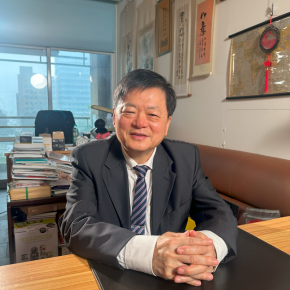CNRS Chemistry welcomes Ru-Shi Liu as the Ambassador for Chemical Sciences
On 2 June, 2025, Ru-Shi Liu, Professor in the Department of Chemistry at the National Taiwan University, will begin a series of lectures in several French CNRS laboratories as CNRS Ambassador for Chemical Sciences in France1 . Specializing in the design and synthesis of new materials for energy and optoelectronics, his research focuses on phosphorescent materials for light-emitting diodes (LEDs), materials for energy conversion (such as water splitting, fuel cells and batteries), and nanomaterials in medicine, particularly for photodynamic therapy.
- 1In 2019, CNRS Institute of Chemistry has initiated a program called "Ambassadors for Chemical Sciences in France". Its ambition is to give prestigious foreign researchers an opportunity to visit a series of French laboratories active in their field. These visits not only include top-notch conferences by the ambassador, but are also a good opportunity to establish preliminary contacts and foster international collaborations for the visited French laboratories.
Considerable effort is focused on developing new materials for energy and optoelectronics. Can you tell us more about your team's work in this field?
My team's research lies at the interface of several fields of chemistry. First and foremost, we are interested in the fundamental principles and mechanisms of materials chemistry, developing new syntheses or formulations, new methods of analysis, and moving towards a wide variety of applications.
We are also exploring several ways of converting light. Conversion into light, with the development of fluorescent materials and formulations for white light-emitting diodes and cell phone screens. Conversion into electricity, with materials for water separation, fuel cells, secondary lithium-ion batteries, and metal-air batteries. And into heat, with new nanomaterials for photothermal and photodynamic therapy in the biomedical field.
We are also exploring new materials, such as phosphors and quantum dots, for light-emitting diodes and all-solid-state lithium-ion batteries.
For all our very fundamental work involving light, our aim is to turn our fundamental research results into applications in a wide range of fields, including optoelectronics, energy, and biomedicine. And find industrial developments for them, wherever possible.
What progress can we expect in this area over the next few years?
To name but a few, I believe we will see the emergence of new materials more optimized for this photoconversion of light (notably light-light, light-electricity, and light-heat), increasing their efficiency and making the energy produced more attractive and competitive.
Reducing dependence on fossil fuels will remain a topical issue for a long time to come. We can therefore, expect to see the emergence of new renewable energy production technologies, such as lithium-ion solid-state batteries and metal-air batteries, which will also help reduce greenhouse gas emissions.
Transforming research results into practical applications and promoting innovative development in optoelectronics, energy, biomedical technologies, and other fields also seem to me to be essential.
Finally, to achieve these objectives, research in this field, as in others, will have to take care to preserve sustainable development, the environment, and the planet's energy by designing green materials and efficient recycling technologies (life cycle).
As Ambassador for Chemical Sciences in France, do you have any particular expectations of this upcoming tour?
I'm looking forward to this lecture tour, which will give me the opportunity for in-depth exchanges with scientists from a variety of fields and to establish new interdisciplinary collaborations. I'm here to communicate and share my team's research findings and technical knowledge, with the ultimate aim of transforming these results into rapidly usable technological innovations.
Thanks to this stay, I'll be able to expand my network of colleagues and gain a better understanding of the most promising technological advances so that together we can better explore the avenues of research likely to have a positive impact on the environment, society, and the economy.
Finally, I hope that each and every one of us will have the courage to step out of our comfort zones, which is the most effective way of working together to promote innovative scientific research and bring about positive societal change in Taiwan, France and why not, the whole world.
Editor: CCdM
Une version française de cette interview est aussi disponible.
Ru-Shi Liu's lectures tour in France
- 02/06/2025 - Rouen - Institut CARMeN (contact : Laetitia Chausset Boissarie)
- 03/06/2025 - Caen - Laboratoire de cristallographie et sciences des matériaux (contacts : Antoine Maignan, Bernard Raveau)
- 05/06/2025 - Nantes - Institut des matériaux de Nantes Jean Rouxel (contact : Romain Gautier)
- 06/06/2025 - Palaiseau - Institut photovoltaïque d’Île de France (contact : Jean-Francois Guillemoles) et Laboratoire de chimie moléculaire (contact : Cédric Tard)
- 10/06/2025 - Strasbourg - Institut Charles Sadron (contact : Daniel Grande)
